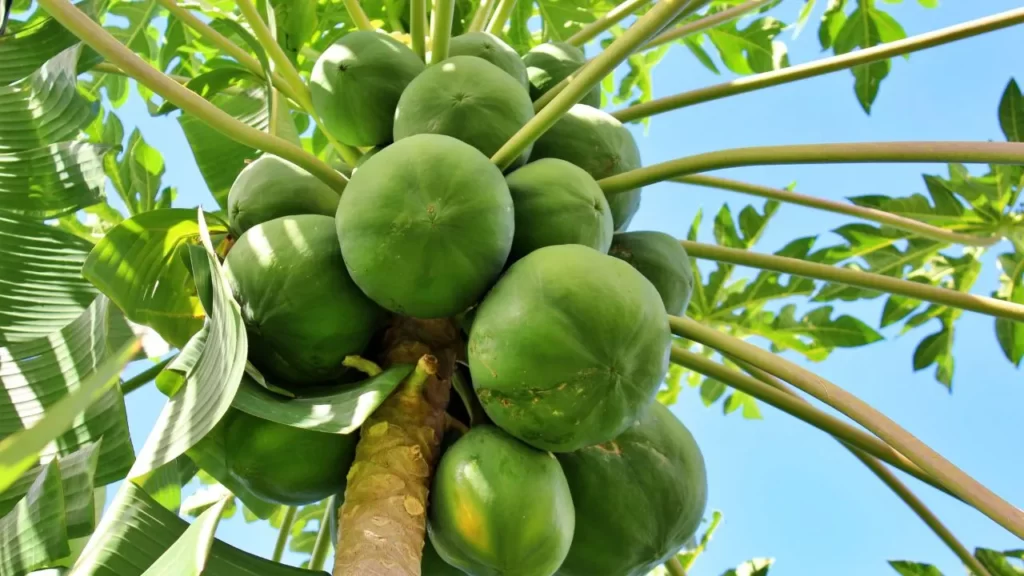Discover the extraordinary health benefits of papaya – from digestive wellness to heart health, immune support, and radiant skin. Learn why adding papaya to your daily diet is a delicious journey toward holistic well-being.
Papaya, often hailed as the “fruit of angels,” originates from Central America and thrives in tropical regions globally. Beyond its delectable taste, this fruit is a nutritional powerhouse with centuries of application in traditional medicine.
The scientific name of this fruit is Carica papaya, it’s not just a delicious tropical fruit; it’s a botanical wonder with a rich history and global presence. From its scientific roots to diverse names across continents, papaya has woven itself into the fabric of cultures and cuisines. In this article, we embark on a journey through the origins, health benefits, and diverse varieties of this vibrant orange and green fruit.
Origin and Historical Significance:
Carica papaya, the scientific label for papaya, traces its origins back to Central America. Indigenous communities in this region not only savored the sweet taste of papayas but also recognized their medicinal properties. The 1500s and 1600s witnessed Spanish and Portuguese colonizers’ dispersal of papaya seeds to tropical destinations like the Philippines and India, expanding its global footprint.
Global Papaya Production:
Today, papayas thrive in tropical havens like Hawaii, the Philippines, India, Ceylon, Australia, and various African regions. While these locations boast the highest papaya production, smaller yet vibrant papaya-farming operations endure in Central and South America. However, the fruit’s vulnerability to freezing temperatures makes tropical climates essential for a flourishing papaya crop.
What are the Names of Papaya Across Continents
Carica papaya goes by various names worldwide, showcasing its cultural significance. In Australia, it adopts the moniker “pawpaw,” while southern Asia embraces names like “kepaya,” “lapaya,” or “tapaya.” in India it is well-known as “Papita”.The French refer to it as “figueir des iles,” translating to fig of the islands. In Spanish-speaking regions, papaya may be known as “melon zapote,” “fruta bomba,” or “mamona.”
Varieties of Papaya: The diversity of papaya extends beyond its cultural nomenclature to a spectrum of varieties available in markets. Some notable ones include Kapaho solo (or puna solo), Waimanolo, Higgins, Wilder, Hortus gold, Honey gold, Bettina, Improved Peterson, Sunnybank, Guinea gold, Coorg honeydew, and Washington. Each variety brings its unique flavor and characteristics to the table, contributing to the global appeal of papaya. you can also see the different varieties name in table below:
| Variety | Scientific Name | Characteristics |
|---|---|---|
| Kapaho Solo | Carica papaya | – Sweet flavor |
| – Puna Solo is a sub-variety | ||
| Waimanolo | Carica papaya | – Distinctive taste with tropical notes |
| Higgins | Carica papaya | – Known for its sweetness and aromatic qualities |
| Wilder | Carica papaya | – Offers a balance of sweetness and juiciness |
| Hortus Gold | Carica papaya | – Rich, golden color with a sweet taste |
| Honey Gold | Carica papaya | – Sweet and honey-like flavor |
| Bettina | Carica papaya | – Unique flavor profile, appreciated for its taste |
| Improved Peterson | Carica papaya | – Improved characteristics over standard varieties |
| Sunnybank | Carica papaya | – Bright and sunny, known for its vibrant taste |
| Guinea Gold | Carica papaya | – Distinctive, tropical flavor |
| Coorg Honeydew | Carica papaya | – Sweet with a hint of honey, popular in Coorg, India |
| Washington | Carica papaya | – Known for its large size and sweet taste |
This table highlights various papaya varieties, each bringing its unique characteristics and flavors to the diverse palette of papaya enthusiasts worldwide.
Top 11 Health Benefits of Papaya.

1. Enhances Digestive Health
Papaya, rich in papain, aids in protein digestion, alleviating issues like bloating and indigestion. It’s a traditional remedy for stomach ailments, addressing concerns like acid reflux and ulcers. The fruit’s high fiber content promotes a healthy digestive tract, preventing constipation.
2. Aids Weight Loss
With its low calorie count and high fiber content, papaya is an excellent choice for weight management. It fosters a sense of fullness, reducing the likelihood of unhealthy snacking. Its natural sweetness helps curb sugar cravings.
3. Manages Diabetes
Papaya’s moderate glycemic index and fiber content make it suitable for diabetes management. It regulates blood glucose levels and offers a satisfying, sweet option for those with diabetes.
4. Boosts Heart Health
Papaya’s potassium, fiber, and antioxidant-rich composition contribute to heart health. It regulates blood pressure, manages cholesterol levels, and prevents cardiovascular issues.
5. Strengthens the Immune System
Abundant in vitamin C, papaya stimulates white blood cell production, bolstering the immune system. Regular consumption supports overall health and disease resistance.
6. Alleviates Inflammation
Papain, along with vitamins and antioxidants in papaya, combats inflammation by neutralizing free radicals. This aids in reducing oxidative stress and minimizing inflammation at the molecular level.
7. May Lower Cancer Risk
Studies suggest papaya’s chemotherapeutic properties may reduce the risk of certain cancers. Antioxidants in papaya inhibit the growth of cancer cells, particularly in the digestive tract.
8. Protects Eyesight
Carotenoids like zeaxanthin and lutein in papaya contribute to eye health, lowering the risk of macular degeneration. The fruit’s vitamin A content supports healthy mucus membranes.
9. Protects and Moisturizes Skin
Papaya’s enzymes, especially papain, exfoliate the skin, promoting rejuvenation. Vitamins A, C, and E offer antioxidant protection, preventing premature aging and maintaining skin firmness.
10. Stimulates Hair Growth
Folic acid in papaya stimulates hair growth, while papaya seeds control dandruff. Regular use can lead to stronger, longer hair.
11. May Increase Breast Milk Production
Green papaya, known to boost oxytocin production, may increase breast milk supply. It’s a beneficial addition to the diet of lactating mothers.
Nutritional Value of Papaya
| Nutrient | Quantity per 100g (3.5 oz) | % Daily Value (DV) |
|---|---|---|
| Energy | 179 kJ (43 kcal) | – |
| Carbohydrates | 10.82 g | – |
| – Sugars | 7.82 g | – |
| – Dietary Fiber | 1.7 g | – |
| Fat | 0.26 g | – |
| Protein | 0.47 g | – |
| Vitamins | ||
| – Vitamin A equiv. | 6% | 47 μg |
| – beta-Carotene | 3% | 274 μg |
| – lutein zeaxanthin | 89 μg | |
| – Thiamine (B1) | 2% | 0.023 mg |
| – Riboflavin (B2) | 2% | 0.027 mg |
| – Niacin (B3) | 2% | 0.357 mg |
| – Pantothenic acid (B5) | 4% | 0.191 mg |
| – Folate (B9) | 10% | 38 μg |
| – Vitamin C | 75% | 62 mg |
| – Vitamin E | 2% | 0.3 mg |
| – Vitamin K | 2% | 2.6 μg |
| Minerals | ||
| – Calcium | 2% | 20 mg |
| – Iron | 2% | 0.25 mg |
| – Magnesium | 6% | 21 mg |
| – Manganese | 2% | 0.04 mg |
| – Phosphorus | 1% | 10 mg |
| – Potassium | 4% | 182 mg |
| – Sodium | 1% | 8 mg |
| – Zinc | 1% | 0.08 mg |
| Other Constituents | ||
| – Water | 88 g | |
| – Lycopene | 1828 µg |
Note: Daily Values (DV) are based on a 2000-calorie diet.
Papaya Seed Benefits:
Combatting Intestinal Parasites:
Papaya seeds, a traditional remedy, are believed to possess antiparasitic effects. Studies suggest that certain compounds in the seeds aid in eliminating harmful organisms from the digestive tract.
Liver Protection:
Compounds like flavonoids and phenolic acids in papaya seeds may contribute to liver health, offering potential protective effects on this vital organ.
Anti-Inflammatory Properties:
Bioactive compounds in papaya seeds may harbor anti-inflammatory properties, providing relief from inflammatory conditions and promoting overall well-being.
Papaya Enzyme Benefits:
Digestive Powerhouse:
Papain, a key enzyme in papaya, aids in breaking down dietary proteins, reducing bloating, gas, and indigestion.
Wound Healing:
Topical application of papaya enzyme creams or ointments is thought to facilitate wound healing by removing dead or damaged tissue.
Skincare Marvel:
Papaya enzymes, especially papain, are sought after in skincare products for their exfoliating properties, promoting smoother and radiant skin.
Nutritional Richness of Papaya:
A medium-sized papaya packs a nutritional punch, offering over 200% of the daily recommended vitamin C intake. It is also a rich source of folate, vitamin A, fiber, copper, magnesium, potassium, and pantothenic acid.
Nutrient Content per Serving:
- Calories: 119
- Protein: 1.3g
- Carbohydrates: 30g
- Fat: <1g
- Dietary Fiber: 4.7g
- Sugar: 21.58g
When Should We Avoid it?
While generally safe, some individuals may experience allergic reactions to papaya. Those monitoring sugar intake should consume papaya in alignment with their health needs.
Papaya in Supplements
Papaya has various health benefits, you shouldeat papaya every day at least 1 to 2 cups or 2 slices of papaya. but if you are living in such an area where you did not get papaya then you can also use its Supplements in the market different type of supplement is available you can buy it from local market or online on Amazon here we give the links to some Papaya supplements, If you have requirement, you can check it out (if you buy from that link we will get little commission on that buy)
- Papaya Leaf Extract Digestive Enzymes – 10X Strength 60/600mg Veg Capsules
- Pure Nutrition Papaya Complete – 60 Veg Capsules (Supports Platelet Immunity & Digestion) Carica Papaya Fruit and Leaf Extract. Non-GMO (Gluten-Free)
Takeaway
Papaya stands as nature’s pharmacy, offering a spectrum of health benefits. From digestive aid to immune support and skin rejuvenation, it’s a versatile fruit worth incorporating into your daily diet.
More From Ayurveda Sci.
To Fuel Your Weight Loss Journey: 6 Best Protein-Rich Vegetarian Foods

